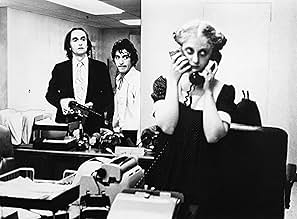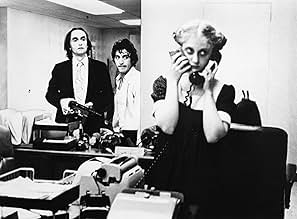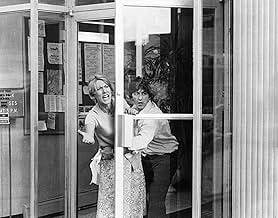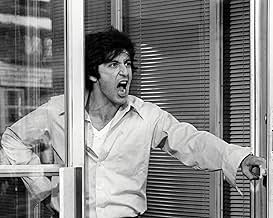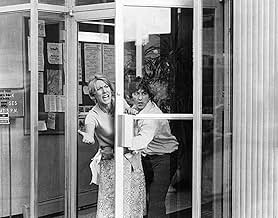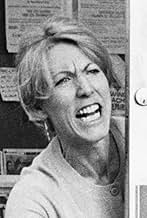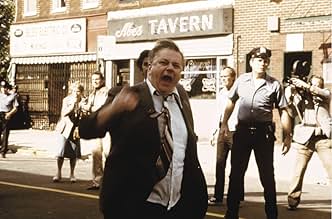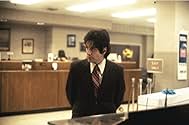Un homme dévalise une banque pour payer l'opération de son petit-ami? le braquage se transforme en prise d'otages et en cirque médiatique.Un homme dévalise une banque pour payer l'opération de son petit-ami? le braquage se transforme en prise d'otages et en cirque médiatique.Un homme dévalise une banque pour payer l'opération de son petit-ami? le braquage se transforme en prise d'otages et en cirque médiatique.
- Réalisation
- Scénario
- Casting principal
- Récompensé par 1 Oscar
- 14 victoires et 20 nominations au total
Résumé
Reviewers say 'Dog Day Afternoon' is celebrated for Al Pacino's compelling performance and Sidney Lumet's direction. It explores themes like crime, media influence, and social issues. The film is praised for its realistic depiction, strong characters, and blend of drama and humor. However, some find it overly long and uneven. Despite mixed opinions on pacing and length, it is generally regarded as a significant work in American cinema, capturing the 1970s spirit.
Avis à la une
... which it does, in buckets. Founded on a very interesting true story, embellished by Al Pacino who turns it into gold, albeit not in the quantities his character would have hoped for. With a stonking supporting cast, non better than John Cazale, you'll be drawn into the events presented as if you were there on the day, or afternoon, and quite probably investigate further as the titles start to role. Without question one of the best films of the 70s and one of few that retains its progressive and powerful impact all these years later.
Personally, this is one of the most touching films I've seen.
The acting is superb, both Al Pacino and John Cazale deliver outstanding and memorable performances as the unexperienced bank robbers Sonny Wortzik and Sal.
I should highlight the late John Cazale's performance of Sal, a character that says more with his face than he does with dialogue. Perhaps the most realistic character ever portrayed on film.
Al Pacino as usual delivers a great performance as was nominated for an Academy Award playing the role of Sonny.
This is a very entertaining film, filled with humor, social issues and moral issues, definitely a must-watch.
The acting is superb, both Al Pacino and John Cazale deliver outstanding and memorable performances as the unexperienced bank robbers Sonny Wortzik and Sal.
I should highlight the late John Cazale's performance of Sal, a character that says more with his face than he does with dialogue. Perhaps the most realistic character ever portrayed on film.
Al Pacino as usual delivers a great performance as was nominated for an Academy Award playing the role of Sonny.
This is a very entertaining film, filled with humor, social issues and moral issues, definitely a must-watch.
The late John Wojtowicz whose mad exploit on one afternoon in Brooklyn probably never dreamed his life would result in an awarded picture. But I suppose the Oscar that Frank Pierson won for Best Original Screenplay kind of verified his time on earth. Not to mention the five other Oscar categories Dog Day Afternoon was nominated in, Best Picture, Best Film Editing, Best Director for Sidney Lumet, Best Actor for Al Pacino and Best Supporting Actor for Chris Sarandon.
It all happened to be sure on Avenue P in Brooklyn, the location that the film was shot on 10th Street was not where it happened, just the same borough. But the film sure comes close to graphically illustrating the bizarre carnival of events that happened in the summer of 1972.
Al Pacino playing Sonny Wojcik is a gay man who has left his wife and kids and is now living with a man who has confessed to him he's a transgender individual and the doctors have recommended a sex change for him. The sexually confused Pacino and at that time he was hits on this mad move to rob a bank to get enough money for sexual reassignment. At that time the cost they're talking about is $2500.00 which now wouldn't pay for the scrub nurse. Then as now medical insurance companies won't cover it.
So Pacino goes in with buddies John Cazale and Gary Springer and pulls a robbery at closing time at a Brooklyn bank. They're supposed to be in and out, but these guys aren't professional criminals. One thing leads to another and law enforcement has Pacino and Cazale trapped, Springer having opted out of the crime real early.
Then the media freak show begins, at first with crowd actually on Pacino's side as he gives lip to the law. Then when they find out what is the underlying motive for the robbery, good old homophobia takes over. The cheers turn to jeers when Pacino comes out in the street for the police and the cameras.
Dog Day Afternoon is a key film for the gay/lesbian/bisexual/transgender community in the USA. It's one of the first that explores a gamut of issues like the closet, internalized homophobia, being forced into marriage for convention's sake, even same gender marriage. It's exploitive to be sure, but does have its tender moments as well. The highlight of the film for me is the phone conversation with Pacino and Sarandon who had no idea what Pacino had in mind. Sarandon gave one of the first performances of a transgender person in a major motion picture.
John Wojtowicz, Sonny Wojcik for the film did a stretch in the federal pen for the bank robbery and after he was released I met him. By the time we met, both of us were comfortable in our sexuality, I was most closeted when this incident happened. When we met it was the late Eighties. If I was comfortable, John Wojtowicz was positively reveling in it.
Dog as he was then known because of the film was a character in the Greenwich Village bar scene where I met him. Dog used his celebrity, notoriety if you prefer, to get himself a fabulous share of rent boys whom he paid nominal monies for services. He carried ever ready copy of faded clippings from the crime and some of those dumb kids actually thought of him as something special. As a character Dog certainly was.
When I moved out of New York I didn't see Dog around any more and he died a few years ago. The man had his fifteen minutes of celebrity and worked it to the max. This review is dedicated to John Wojtowicz as one unforgettable individual.
It all happened to be sure on Avenue P in Brooklyn, the location that the film was shot on 10th Street was not where it happened, just the same borough. But the film sure comes close to graphically illustrating the bizarre carnival of events that happened in the summer of 1972.
Al Pacino playing Sonny Wojcik is a gay man who has left his wife and kids and is now living with a man who has confessed to him he's a transgender individual and the doctors have recommended a sex change for him. The sexually confused Pacino and at that time he was hits on this mad move to rob a bank to get enough money for sexual reassignment. At that time the cost they're talking about is $2500.00 which now wouldn't pay for the scrub nurse. Then as now medical insurance companies won't cover it.
So Pacino goes in with buddies John Cazale and Gary Springer and pulls a robbery at closing time at a Brooklyn bank. They're supposed to be in and out, but these guys aren't professional criminals. One thing leads to another and law enforcement has Pacino and Cazale trapped, Springer having opted out of the crime real early.
Then the media freak show begins, at first with crowd actually on Pacino's side as he gives lip to the law. Then when they find out what is the underlying motive for the robbery, good old homophobia takes over. The cheers turn to jeers when Pacino comes out in the street for the police and the cameras.
Dog Day Afternoon is a key film for the gay/lesbian/bisexual/transgender community in the USA. It's one of the first that explores a gamut of issues like the closet, internalized homophobia, being forced into marriage for convention's sake, even same gender marriage. It's exploitive to be sure, but does have its tender moments as well. The highlight of the film for me is the phone conversation with Pacino and Sarandon who had no idea what Pacino had in mind. Sarandon gave one of the first performances of a transgender person in a major motion picture.
John Wojtowicz, Sonny Wojcik for the film did a stretch in the federal pen for the bank robbery and after he was released I met him. By the time we met, both of us were comfortable in our sexuality, I was most closeted when this incident happened. When we met it was the late Eighties. If I was comfortable, John Wojtowicz was positively reveling in it.
Dog as he was then known because of the film was a character in the Greenwich Village bar scene where I met him. Dog used his celebrity, notoriety if you prefer, to get himself a fabulous share of rent boys whom he paid nominal monies for services. He carried ever ready copy of faded clippings from the crime and some of those dumb kids actually thought of him as something special. As a character Dog certainly was.
When I moved out of New York I didn't see Dog around any more and he died a few years ago. The man had his fifteen minutes of celebrity and worked it to the max. This review is dedicated to John Wojtowicz as one unforgettable individual.
By the time Sidney Lumet's "Dog Day Afternoon" came around he had already learned to let Al Pacino loose. Forget the holdbacks of "Serpico"; here we get a glimpse into the real Al, the actor who would bring Tony Montana to life in the years to come and the same man who provided Michael Corleone with such heartfelt warmth that was lacking in some of his lesser characters.
There's essentially the Al Pacino as an actor and the Al Pacino as a character, and here he's the character, and it works splendidly. Al Pacino the actor comes into play when he is given a recycled script and a talentless director, which has been happening a lot lately, although fortunately his comparison, De Niro, has been lucky enough to generally avoid these blunders of older-age film-making.
This is based on a true story, like "Serpico," only it's better and more involving. It connects with the audience more than "Serpico" because it doesn't jump through the same old hoops; it goes for the long trek and comes off better than it would have had the team behind it been lazy. The clichés are gone and the originality creeps in early on. Watch Pacino indulge himself in character and let the plot sink in. It's more touching than it seems at first.
Pacino is Sonny Wortzik, a Brooklyn man who takes a bank hostage in order to pay for his "wife's" operation. The wife is actually Leon Shermer (Chris Sarandon who was Oscar-nominated for this, his first role in a mainstream film), Sonny's gay lover who doesn't have the money for a sex operation.
The bank robbery was going to be what one of classic cinema's greatest bad guys once described as a quick "in and out," but Sonny gets held up inside the bank and soon he's all over the news and police are standing outside the building with guns drawn. It's like Denzel's movie only better and more original. Oh, and true. This one actually happened and we can tell.
Sonny's partner in crime, Sal (John Cazale), is worried that he'll be treated as a homosexual by the media outside. His fretting is comic relief and one of the connections between the film and the audience. Charles Durning is the frustrated cop handling the situation. His performance is as subtly convincing as Cavale's.
Pacino's performance is exceedingly excellent, manic and energetic. He'd display this same talent in "Scarface" again eight years later; only he would be bashed by the critics for going over-the-top. (Although they really just had problems with the excessive profanity and violence, just like Mel Gibson's "The Passion of the Christ" will soon become a well-known classic and people will laugh when they hear that someone once called it the most violent film ever made.)
There's also one of the best scenes of all time in this movie that rivals Montana's Last Stand in "Scarface" or the Baptism Scene in "The Godfather," which involves Sonny speaking on the phone to his "wife," carefully concealing his motive from any listeners nearby. Watch Pacino delve into character here and you're immediately hooked. We like his character because he seems real and Pacino makes him real, and that's why this will go down as one of the best tour de force performances of all time.
Is this Hollywood trying to ease our culture onto homosexuality and sex change operations? Is Hollywood trying to gradually introduce us to gay characters in the hope that the uptight American families will be increasingly invaded by the images of gay men? No. This is Hollywood showing us a true story, regardless of the homosexuality. Pacino could be playing a frustrated postal worker and it would still work because it all settles down to the fact that the suspense and dramatics of the movie affect us, not the background of its characters.
Sarandon's Oscar nomination was more than worthy; here he displays the smarmy talent that would shine through in his characters in the years to come. Prince Humperdink from "The Princess Bride" is equally memorable but less realistic. Here he seems more real, which is good for this film and would have been quite bad for "Bride." We don't like real characters in fantasy tales, do we?
Lumet, who ruined "Serpico" with his bad editing, out-of-place music, clichéd dialogue/events and unnecessary scenes, directs "Dog Day Afternoon" with style and flair and good pacing and a surprisingly heartfelt sense of emotion and care. This isn't exactly a good example of a perfect motion picture but it's pretty close.
There's essentially the Al Pacino as an actor and the Al Pacino as a character, and here he's the character, and it works splendidly. Al Pacino the actor comes into play when he is given a recycled script and a talentless director, which has been happening a lot lately, although fortunately his comparison, De Niro, has been lucky enough to generally avoid these blunders of older-age film-making.
This is based on a true story, like "Serpico," only it's better and more involving. It connects with the audience more than "Serpico" because it doesn't jump through the same old hoops; it goes for the long trek and comes off better than it would have had the team behind it been lazy. The clichés are gone and the originality creeps in early on. Watch Pacino indulge himself in character and let the plot sink in. It's more touching than it seems at first.
Pacino is Sonny Wortzik, a Brooklyn man who takes a bank hostage in order to pay for his "wife's" operation. The wife is actually Leon Shermer (Chris Sarandon who was Oscar-nominated for this, his first role in a mainstream film), Sonny's gay lover who doesn't have the money for a sex operation.
The bank robbery was going to be what one of classic cinema's greatest bad guys once described as a quick "in and out," but Sonny gets held up inside the bank and soon he's all over the news and police are standing outside the building with guns drawn. It's like Denzel's movie only better and more original. Oh, and true. This one actually happened and we can tell.
Sonny's partner in crime, Sal (John Cazale), is worried that he'll be treated as a homosexual by the media outside. His fretting is comic relief and one of the connections between the film and the audience. Charles Durning is the frustrated cop handling the situation. His performance is as subtly convincing as Cavale's.
Pacino's performance is exceedingly excellent, manic and energetic. He'd display this same talent in "Scarface" again eight years later; only he would be bashed by the critics for going over-the-top. (Although they really just had problems with the excessive profanity and violence, just like Mel Gibson's "The Passion of the Christ" will soon become a well-known classic and people will laugh when they hear that someone once called it the most violent film ever made.)
There's also one of the best scenes of all time in this movie that rivals Montana's Last Stand in "Scarface" or the Baptism Scene in "The Godfather," which involves Sonny speaking on the phone to his "wife," carefully concealing his motive from any listeners nearby. Watch Pacino delve into character here and you're immediately hooked. We like his character because he seems real and Pacino makes him real, and that's why this will go down as one of the best tour de force performances of all time.
Is this Hollywood trying to ease our culture onto homosexuality and sex change operations? Is Hollywood trying to gradually introduce us to gay characters in the hope that the uptight American families will be increasingly invaded by the images of gay men? No. This is Hollywood showing us a true story, regardless of the homosexuality. Pacino could be playing a frustrated postal worker and it would still work because it all settles down to the fact that the suspense and dramatics of the movie affect us, not the background of its characters.
Sarandon's Oscar nomination was more than worthy; here he displays the smarmy talent that would shine through in his characters in the years to come. Prince Humperdink from "The Princess Bride" is equally memorable but less realistic. Here he seems more real, which is good for this film and would have been quite bad for "Bride." We don't like real characters in fantasy tales, do we?
Lumet, who ruined "Serpico" with his bad editing, out-of-place music, clichéd dialogue/events and unnecessary scenes, directs "Dog Day Afternoon" with style and flair and good pacing and a surprisingly heartfelt sense of emotion and care. This isn't exactly a good example of a perfect motion picture but it's pretty close.
'Dog Day Afternoon' tells the true story of Sonny (Al Pacino) and Sal (John Cazale). These two guys went into a bank in 1972 in Brooklyn to rob it. They could have been out in five minuted but things went terribly wrong. Instead of a robbery it became a hostage situation. And a media circus as well.
From the first second you will be totally in the movie. Afterwards I wanted to write my review and I was not able to remember how the music was, if there was any. It says something about how much the movie grabs you. The first part is very funny, I laughed a lot of times. The second part is more a drama and a thriller. Great director Sidney Lumet creates a certain atmosphere for the movie that is just right. Pacino in one of his best performances is surrounded by a great supporting cast. He was nominated for an Oscar but didn't win it. He lost it to a guy named Jack Nicholson in a movie called 'One Flew over the Cuckoo's Nest'. The chances were probably fifty-fifty and the Oscar went to the better movie, I have to admit that. Still, one of the best performances I have ever seen. With any other actor this movie was a nice one, with him it is a great one.
From the first second you will be totally in the movie. Afterwards I wanted to write my review and I was not able to remember how the music was, if there was any. It says something about how much the movie grabs you. The first part is very funny, I laughed a lot of times. The second part is more a drama and a thriller. Great director Sidney Lumet creates a certain atmosphere for the movie that is just right. Pacino in one of his best performances is surrounded by a great supporting cast. He was nominated for an Oscar but didn't win it. He lost it to a guy named Jack Nicholson in a movie called 'One Flew over the Cuckoo's Nest'. The chances were probably fifty-fifty and the Oscar went to the better movie, I have to admit that. Still, one of the best performances I have ever seen. With any other actor this movie was a nice one, with him it is a great one.
Le saviez-vous
- AnecdotesAlthough he had initially agreed to play the part of Sonny, Al Pacino told Sidney Lumet near the start of production that he couldn't play it. Pacino had just completed production on Le Parrain, 2ᵉ partie (1974) and was physically exhausted and depressed after the shoot. With his reliance on the Method, Pacino didn't relish the thought of working himself up to a state of near hysteria every day. Lumet unhappily accepted the actor's decision and dispatched the script to Dustin Hoffman. Pacino reportedly changed his mind when he heard that his rival was being considered for the role.
- GaffesIn 1972, NYC police squad cars were dark green and white, not blue and white which debuted about two years later.
- Crédits fousOpening credits prologue: What you are about to see is true - It happened in Brooklyn, New York on August 22, 1972.
- Versions alternativesThe 1997 DVD contained the opening 1984 Warner Bros. Pictures plaster and no closing logo.
- ConnexionsFeatured in Lumet: Film Maker (1975)
Meilleurs choix
Connectez-vous pour évaluer et suivre la liste de favoris afin de recevoir des recommandations personnalisées
Everything New on HBO Max in September
Everything New on HBO Max in September
We're excited for "Task," a new crime series from the creator of "Mare of Easttown." See everything else coming to HBO Max this month.
Détails
- Date de sortie
- Pays d’origine
- Sites officiels
- Langue
- Aussi connu sous le nom de
- Tarde de perros
- Lieux de tournage
- Sociétés de production
- Voir plus de crédits d'entreprise sur IMDbPro
Box-office
- Budget
- 1 800 000 $US (estimé)
- Montant brut aux États-Unis et au Canada
- 50 000 000 $US
- Montant brut mondial
- 50 006 771 $US
Contribuer à cette page
Suggérer une modification ou ajouter du contenu manquant




